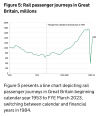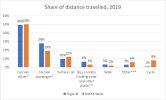I fear there is so much unsatisfied demand for road use that anything that reduces it just gets other potential car users to fill the "gaps".
As I said it's going to take time for rail to free up road capacity, as such the larger the untapped demand the more people will use the new rail service.
Also, even if as soon as there's 1 less car 1 new car replaces it, that doesn't really matter as there would have been growth anyway (even if that's from extra traffic at 2 in the morning as it's so congested the rest of the time), so again even if road use stayed as it is then it actually would still be lower than it would have been.
Only problem I can see is the passengers from further out will all be moaning - damn another detour., you could have walked that.
Depends on the numbers on each bus, if the bus has capacity for 70 then yes you may see something like that, however such buses are likely to be limited to more fixed routes.
If however the bus can carry 15 people, then the number of detours is likely to be limited, especially for urban travel.
Interesting thing to consider. Would it even increase road use ?.
Possibly, however if you are being charged for each trip then people might not undertake certain trips by road. A classic example would be doing a large shop. If you're going to be charged £1 each way you may walk to the shop and then pay to get back or you may think I'll pay £3 for a delivery as that's not much more than going myself.
The thing with private car ownership is that the extra for each trip isn't that much (most people only consider it the cost of fuel, even though the more miles you do the more other costs you add - for example the sooner you need to replace tyres), so adding an extra 1,000 miles isn't that much more.
However, if you're going to be charged £1 a mile (for a car, which is cheaper than the current cost of taxis which are typically £1.5 a mile or more), you're going to think twice about it.
If you're getting charged 30p a mile (for a bus) you're more likely to still make that trip, but then you may consider the actual need.
It seems young people are leaving home at a later stage in their life these days - because they cannot get a home. So they have access to a car or a lift. They ALSO have less use for a car as Mum and Dad are still gettting the provisions and running the house (diy, garden etc).
They won't always have access to having a lift (for example of their parents are working, are on holiday, otherwise busy) and of course that only applies to those who are living at home.
I would say the congestion charge (and ULEZ) might have cleaned up the air but those paying for the charges and/or switching to a newer vehicle, do not appreciate that improvement. I think the lack of a reduction in traffic clearly indicates that the alternative modes are not there or attractive enough.
The congestion charge did reduce traffic, in fact car and taxis km's in London as a whole fell between 2002 (16.7bn km) and 2012 (15.3bn) before it rose a little until COVID (15.7bn) and it's still noticeable below pre COVID numbers (14.6bn).
HGV's are broadly flat (0.65bn +/- 0.05bn), as buses (0.3bn +/- 0.1bn).
Some of the fall could be explained by an increase in motorbikes and scooters (+0.3bn to 0.7bn), and peddle cycles (+0.3bn to 0.6bn).
The reason that road congestion in London is still an issue even though there's 2bn km fewer car/taxi km's is due to the increase in vans which has increased by 0.8bn since 2000.
Those numbers are for the whole of London. By Borough things are different, and too complex to provide a simple summary of, although with all statistics there'll be those who buck the trend (Havering had seen growing traffic km's whilst most others have been falling).
Data from

roadtraffic.dft.gov.uk
Croydon saw traffic km's increase to 2007 (882 million km) before reducing until 2012 (813 million) before rising to just before COVID (843 million) and still hasn't reached the peak 2023 was 830 million).
Most people do not drive into London because it is nigh on impossible to do so. They use the train because they have to. They will use their car if they can.
Indeed, so improving rail services in (or close to) London would help those people trying to get into London.
Based on personal experience, this is true of younger people. However, also based on personal experience, they're still more than happy to be driven places by their Dad!
Regarding rail versus road, it's instructive to look at countries that have the best rail networks and the highest modal share of rail and public transport - Japan, Switzerland and Netherlands come to mind. Even there, car usage is still up at 60, 70% modal share.
The reason is that cars transformed what journeys were possible, as did previous transport revolutions.
Not only did they replace the previous modes, but they massively increased what was possible to transport, either in quantity, speed or both. Canals transformed the quantity of coal that could be transported, rail transformed things again in terms of speed, motorised road transport transformed accessibility through the ability to get from anywhere to anywhere with a single journey.
Increasing rail's modal share is worth pursuing though. This means major investment to separate intercity, regional and commuter flows so they can all run at high frequencies. But even with an ideal rail network, it won't empty the roads. However, taking the pressure off them is a decent goal in itself, as is providing a high quality public transport alternative to roads where viable.
Again, I don't get where you think that I'm saying we should be seeing road transport as 0% of modal share, or even 49%. The point I'm making is that it could be a bit lower than it currently is.
Actually, for a lot of people if we could get the actual km's travelled by car down a little bit, then that would likely benefit them by there being less congestion - with the biggest winners being car users.
The point I'm making with regards to the LTC is that if we build a rail link you'd see some relief to the existing Thames Crossings from reduced vehicle demand, however you wouldn't apply more pressure to other roads (which the LTC would do by allowing more traffic through a bottleneck).
There's a big difference between arguing that we should be looking at rail/public transport (as compared to new roads) to allow for more travel and arguing that we should be closing roads and replacing them with rail.
In theory it would be possible to do the latter, however we'd need several new railways with the capacity of HS2 to even consider doing so and even then there's still going to be a lot of cat use.
Until then (read almost certainly never) the priority in or near to major urban areas should be not building new roads to cater for growing travel demands, but rather rail where that's likely to help (again not entirely ruling out new roads).
As to history of travel modes, yes each change did result in the majority moving to the new way, it's never totally removed travel by the old methods and sometimes over time you'll see a move back towards the previous methods where there's benefits of using it.
For example rail has seen significant growth in use between 1980 and 2025 (even if current user has fallen to circa 2005 levels due to COVID).
Even inland waterways still account for a noticeable amount of freight transport (yes most of it on the Thames, and yes as a percentage of the whole a tiny amount) but it's not gone away entirely.




